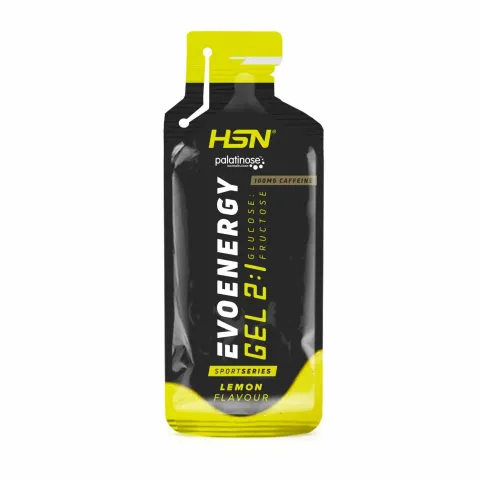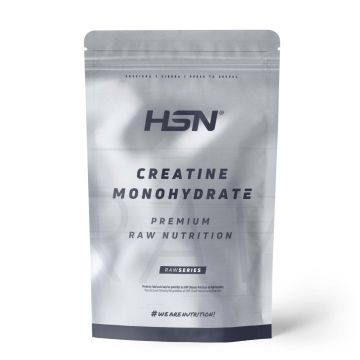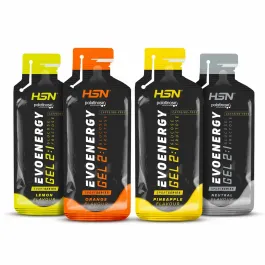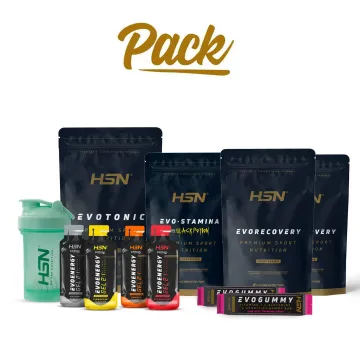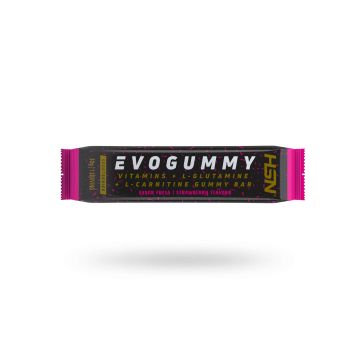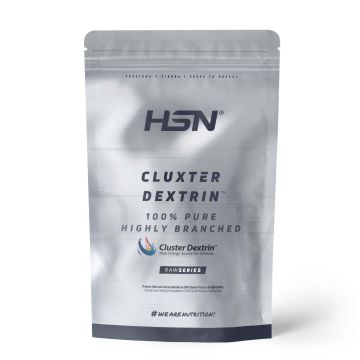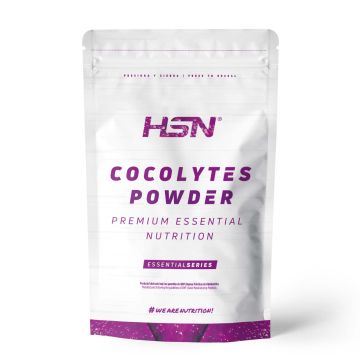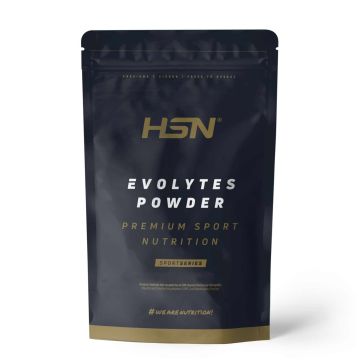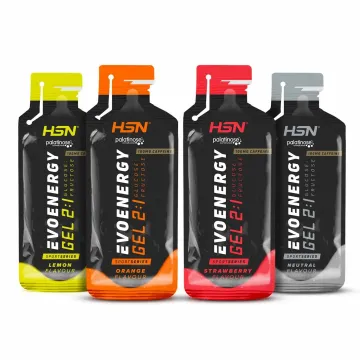- New Evoenergy Gel! - Improved formula, smoother texture, and better composition.
- Our Evoenergy Gels are now lighter. Smoother consistency without being hydro.
- Caffeine version - Perfect for morning workouts or before critical points in races.
- Contains: 30g of carbohydrates + 100mg of sodium + 100mg of caffeine per gel.
- Available in various flavours, including neutral/flavourless. Enjoy with no chemical aftertaste.
- Features a tether strip between the nozzle and pouch to help protect the environment.
- 2:1 glucose to fructose ratio. Each 30g of carbohydrates contains 20g glucose and 10g fructose.
- Sodium selected as the primary electrolyte, being the most concentrated salt lost through sweat.
Discover our new Evoenergy Gel with Caffeine
Evoenergy Gel with Caffeine by SportSeries is the caffeinated version of HSN’s classic Evoenergy Gel. It aims to provide you with efficient amounts of carbohydrates with different absorption rates, mineral salts (electrolytes) for hydration replenishment during sweat-inducing physical exercise, and caffeine for an added boost.
Evoenergy Gel is the classic HSN gel, traditionally thick with a medium consistency. In our reformulation, we’ve made improvements by reducing its density to make it smoother and easier to drink. In this caffeine version, we’ve removed guarana, which was present in the initial launch of these gels. All the caffeine now comes from pure added caffeine.
Evoenergy Gel is a favourite among athletes of all levels, offering a balanced mix of carbohydrates, electrolytes, and caffeine, making it easy to adapt to various endurance activities.
Evoenergy Gel with Caffeine: Is it the best choice?
Choosing the right type of gel
Your choice of sports gel largely depends on your preference for its consistency, as there are options on the market ranging from ultra-smooth to ultra-thick.
Although some prefer one over the other, it ultimately comes down to personal choice. Depending on your individual preferences, you might find one type more comfortable than another.
Ultra-light or ultra-smooth gels are almost liquid, resembling isotonic drinks with a bit more body, but they tend to have a lower nutrient concentration.
On the other hand, ultra-dense gels are designed to be swallowed whole, not 'drunk.' In fact, they’re thick enough to chew, though this isn’t necessary.
Evoenergy Gel, available in both caffeinated and non-caffeinated versions, offers a medium consistency. They’re designed to be drunk but are not hydro gels. In our original formula, the gels were relatively thick, even though they were fluid. Athletes found them too dense after several hours of endurance activity and needed to consume them with water, which isn’t the purpose of gels. With our reformulation, we’ve made them lighter so that you can use them comfortably and adaptably, regardless of the duration or conditions of your activity.
With or without caffeine
One of the changes we’ve made to our Evoenergy Gel with Caffeine is removing guarana from the original formula, as guarana only provides caffeine (guaranine) and can impart bitterness, especially for those sensitive to flavour nuances (guarana can taste bitter).
We’ve precisely calibrated the stimulant content of our gels so that each unit delivers 100mg of pure caffeine, an accurate dose that you can use flexibly. Whether you use just one gel per session or combine caffeinated and non-caffeinated gels, you can safely consume several caffeinated gels during the same session.
When deciding whether to use a caffeinated or non-caffeinated gel, unless your workout is close to bedtime or you are highly sensitive to stimulants, it’s smart to combine both options. This is because caffeine, when used at doses of 4mg/kg of body weight, helps reduce the perception of physical effort during exercise, which is beneficial for your training and competition sessions.
The importance of 2:1 (Glucose: Fructose)
The human intestine cannot absorb unlimited carbohydrates. In fact, glucose is the main carbohydrate source in any sports drink or preparation (like gels).
However, combining it with alternative monosaccharides (specifically fructose) enhances carbohydrate absorption in the digestive system.
Evoenergy Gel has been developed based on scientific evidence showing the ideal ratio of different monosaccharides for efficient absorption. It delivers:
- Glucose as dextrose, cyclic dextrin, and isomaltulose (Palatinose™).
- Fructose as isomaltulose (Palatinose™).
Carbohydrates, electrolytes, and caffeine: Everything you need!
Evoenergy Gel contains everything you need to enhance your physical endurance and optimise your athletic performance:
- Carbohydrates from various sources, providing mixed absorption rates and combined in a specific ratio for optimal absorption.
- Sodium, the primary electrolyte lost through sweat during physical exertion, present in high concentrations in extracellular fluid.
- Caffeine, a natural alkaloid found in coffee beans, which at sufficient doses can improve endurance and reduce the perception of physical effort.
And it’s all available in a convenient 55ml single-dose format, ready to open and consume.
When to use and when to avoid caffeinated gels
There are cases where caffeinated gels are not recommended. These include:
- For people negatively sensitive to stimulants.
- For those sensitive to caffeine’s effects on sleep, when training late in the evening or at night.
However, caffeinated gels are excellent pre-workouts, consumed with water before a morning session.
Of course, their main use is during the session. Many people take them half an hour before a tough phase or physical/mental barrier during a sports event, such as kilometre 21 in a marathon.
It’s also common for athletes to use caffeinated gels during the first hour of a session, then switch to non-caffeinated ones, occasionally using a caffeinated gel every 2-3 hours for an extra energy boost against fatigue.
Learn how to incorporate gels into your nutrition:
Gels shouldn’t form the foundation of intra-workout nutrition because they’re too concentrated. If you want to use them this way, you’ll need to consume plenty of water. Typically, gels are used as a supplement to your sports drink, an isotonic carbohydrate- and electrolyte-based formula:
Carbohydrate intake for intense, long-duration endurance exercise is around 90g per hour.
One Evoenergy Gel provides 30g. Combined with an isotonic formula like Evocarbs 2.0 or Evotonic, you can easily reach the 90g required, which might otherwise be challenging without the gel.
Bibliographic References
- Kozlowski, K. F., Ferrentino-Depriest, A., & Cerny, F. (2021). Effects of Energy Gel Ingestion on Blood Glucose, Lactate, and Performance Measures During Prolonged Cycling. Journal of Strength and Conditioning Research, 35(11), 3111–3119.
- Podlogar, T., & Wallis, G. A. (2022). New Horizons in Carbohydrate Research and Application for Endurance Athletes. Sports Medicine, 52(Suppl 1), 5–23.
- Naderi, A., Gobbi, N., Ali, A., Berjisian, E., Hamidvand, A., Forbes, S. C., … Saunders, B. (2023). Carbohydrates and Endurance Exercise: A Narrative Review of a Food First Approach. Nutrients, 15(6).
- Patterson, S. D., & Gray, S. C. (2007). Carbohydrate-gel supplementation and endurance performance during intermittent high-intensity shuttle running. International Journal of Sport Nutrition and Exercise Metabolism, 17(5), 445–455.
- Saunders, M. J., Luden, N. D., & Herrick, J. E. (2007). Consumption of an oral carbohydrate-protein gel improves cycling endurance and prevents postexercise muscle damage. Journal of Strength and Conditioning Research, 21(3), 678–684.
- Phillips, S. M., Turner, A. P., Sanderson, M. F., Sproule, J., & Ward, S. A. (2012). Carbohydrate gel ingestion significantly improves the intermittent endurance capacity, but not sprint performance, of adolescent team games players during a simulated team games protocol. European Journal of Applied Physiology, 112(3), 1133–1141.
- Naderi, A., Gobbi, N., Ali, A., Berjisian, E., Hamidvand, A., Forbes, S. C., … Saunders, B. (2023). Carbohydrates and Endurance Exercise: A Narrative Review of a Food First Approach. Nutrients, 15(6).
- Vitale, K., & Getzin, A. (2019). Nutrition and supplement update for the endurance athlete: Review and recommendations. Nutrients, 11(6).
 Before
Before After
After During
During Morning
Morning Afternoon
Afternoon Night
Night Before
Before After
After During
During Morning
Morning Afternoon
Afternoon Night
Night Before
Before After
After During
During Morning
Morning Afternoon
Afternoon Night
Night Before
Before After
After During
During Morning
Morning Afternoon
Afternoon Night
Night







